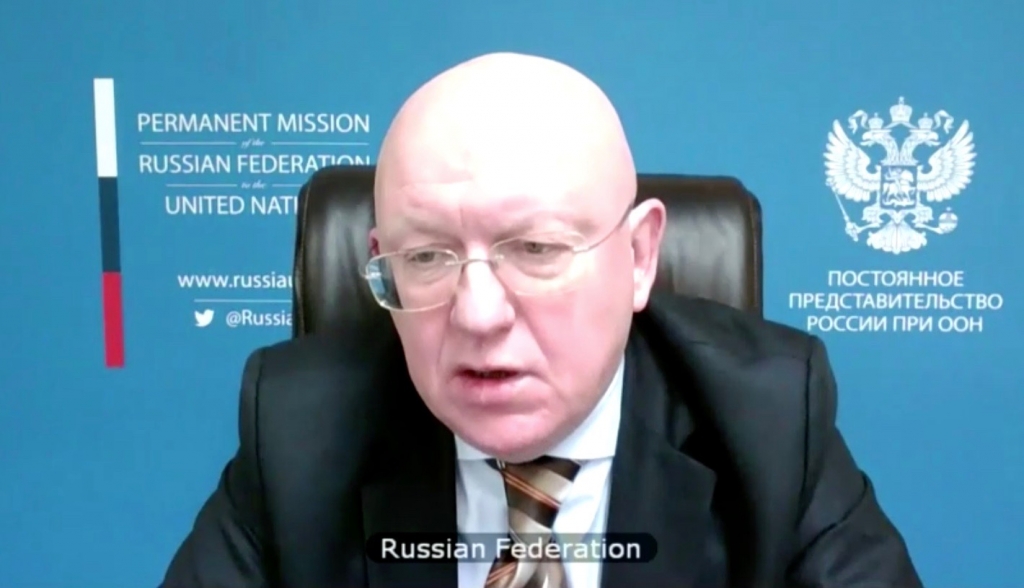Statement by Permanent Representative Vassily Nebenzia at an open VTC of UNSC members "Maintenance of international peace and security: Climate and security"
Mr.President,
We thank the Secretary-General and Ms.Elsaim for their briefings.
Climate change is one of the global challenges that humanity encounters today. To overcome its negative impacts, the international community needs to apply coordinated and comprehensive approaches aimed not only at reducing greenhouse gas emissions, but also at implementing effective adaptation measures. Such work (including at the expert level) is part of common efforts in the interests of sustainable development. It is underway at specialized platforms of the UN system – Framework Convention on Climate Change in the first place.
We welcome the decision by the United States to return to the Paris Climate Agreement.
Mr. President,
The Security Council not once addressed the issue of climate change in the context of its influence on the international peace and security. It considered country cases of a range of states and entire regions, of the African continent in the first place, where climate change and natural disasters were claimed to be the major threat to instability and the root cause of problems. We were also referred to the growing risks of conflicts, and such scenarios were projected onto the global perspective.
We agree that climatic changes and environmental problems can exacerbate conflicts. But are they the root cause? This is rather doubtful.
Firstly, connection between climate and conflict can only be considered with regard to concrete country- and region-specific cases. To speak of it in a generic sense and in a global context is groundless, and to assert that such connection be imminent is even dangerous. Besides, not every conflict means threats to the international peace and security that the UNSC deals with.
Secondly, to assume that climate is the root cause of security issues would mean to walk away from discovering the real causes and stick to the wrong path when trying to resolve those issues.
Thirdly, we must not silence down other fundamental factors that are just as much – or rather even more – fraught with risks. I mean political and socio-economic conditions in concrete countries and regions that as of today have been aggravated by the coronavirus pandemic. The virus has exposed inequality among and within states, provoked upsurge in poverty and starvation, in particular in conflict-affected countries. Illegal unilateral restrictions add to these problems, while those who impose them prefer to ignore their obvious harmfulness.
When putting emphasis on the climate issue, donor states often evade discussing the complex nature of challenges to sustainable development. Among them – rejection to take part in technology exchange, and “green” protectionism. Wouldn’t it be better for the donors to focus on observing the already endorsed financial obligations and ensuring access to the best technologies to increase resilience and adaptation, and assisting with implementation of climate education projects? That is the essence of the preventive approach based on a well-balanced account for the three dimensions of Agenda-2030. Indeed, discussions of climate agenda at the Security Council seem to look advantageous and politically meaningful. Yet the real work to enhance international coordination at this track deems more practical when done at the specialized platforms, such as the General Assembly, ECOSOC, UN development system, and of course the FCCC.
Back to the problem of climate change in the context of international peace and security. We cannot fail to mention that conflict by itself undermines capacities of states to increase resilience and adapt to the negative consequences of climate change, while diverting the already limited resources.
The Sahel is cited as a recent indicative example of a region where the climate change directly affects stability. However, we must not forget the reasons that have exacerbated security risks there. Among them are voluntary actions of some states that led to a regime change in Libya, environmental impact of NATO bomb and missile strikes, i.a. against the oil infrastructure. This is an example of environment being sacrificed to geopolitics. We could cite numerous examples of this.
Mr. President,
Russia supports that there is an urgent need to respond to the climate change. However this should be done within mechanisms that are specifically mandated to do so. It is important to focus on effective implementation of the internationally agreed obligations in the framework of the Paris Agreement, while gradually stepping up their level of ambition. At the same time, we must not loosen global and national efforts on a broader front of countering socio-economic problems in the interests of sustainable development, i.a. in the context of post-pandemic recovery.
Thank you.
